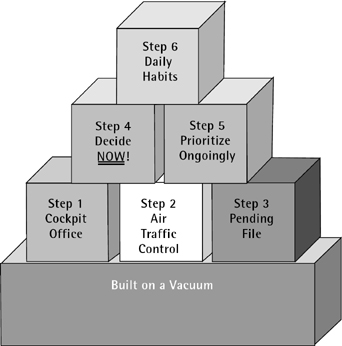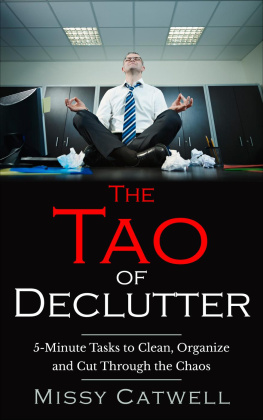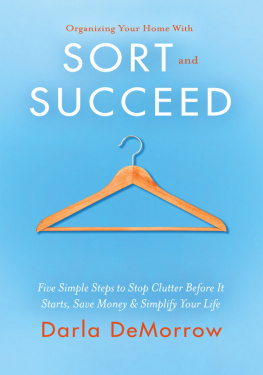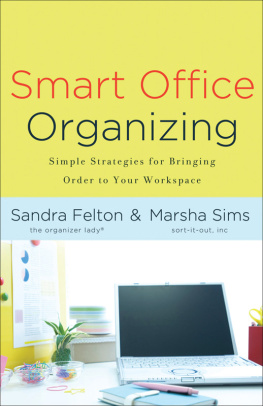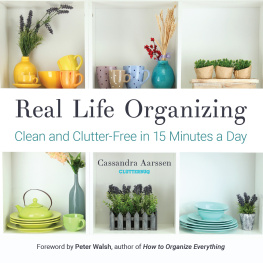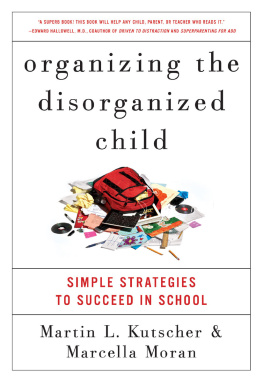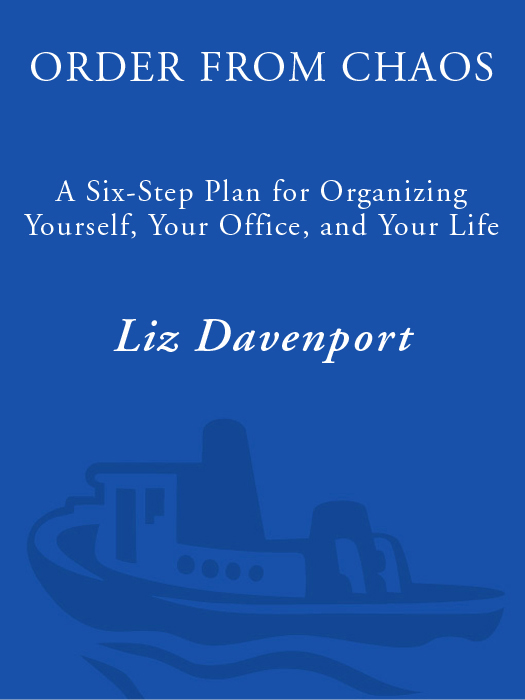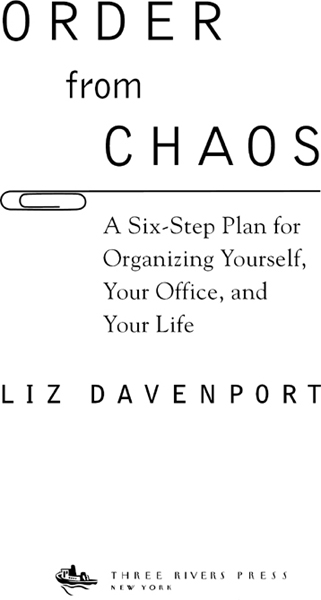To Bob
for all his patience, support, and love
with this creative genius magpie
Thank you, Sweetie!
CONTENTS
BEFORE
YOU BEGIN
Why Get Organized?
The average businessperson receives 190 pieces of information each day. The average businessperson wastes 150 hours each year looking for stuff. Add 10 more hours and that is an entire work month. If you got organized, you could have an extra month each year! Just think how much more you could accomplish (or how much vacation you could have) if you got organized. You could take a three-day weekend every other week and still do as much as you are doing nowor MORE. What a concept.
Most of us have some sort of organizing system or, more likely, multiple systems. Unfortunately, those systems are not all-encompassing. They have holes, things that dont fit or arent accounted for within the system you have designed. The piles on your desk result from holes in your system (as well as from the incoming 190 pieces of information each day). What you need is one, all-encompassing organizing system. Until you have one, simple, intuitive, easy-to-maintain system, attempting to clean off your desk will only thwart, exhaust, and annoy you. And your desk wont stay clean for long.
The average businessperson receives 190 pieces of information each day and wastes 150 hours each year just looking for stuff.
One of the major benefits of having a single, comprehensive system is that we dont have to make thousands of little decisions each day, such as What do I do with this piece of paper? Where can I put this so I can find it again later when I need it? Making 190 of those decisions each day is emotionally and mentally exhausting. Once you have a system, you know where those pieces of paper go, and it is simply a matter of putting them there.
You also need to change the way you think about those 190 pieces of new, incoming information each day. The biggest mistake disorganized folks make is believing there is a later. For us, there is only now and too late. All the things we optimistically put off till later end up just lying there for days, weeks, months, or years. How old are some of the things in your stacks? We need to develop methods for making decisions about things as they come in, not waiting till that magical hour in the mythical later miraculously appears. Then and only then can you begin get control of your own personal chaos.
What qualifies me to help those of you who are by nature disorganized? Because I am just like you. I am, by nature, disorganized. I have the same personality profile as most of my clients; that is, we are creative, we hate details, we are spontaneous, and we like to leave things open-ended. We are the creative geniuses of the world. Our energy is focused on the futurethe next project, the next idea, the next grand scheme. Unfortunately, paper belongs to the past or, at best, the present. Our attention is on the future. Therefore, clutter is the natural side effect of being creative. That doesnt mean we dont have to deal with it; it just means we have a good excuse for our mess!
Those of us who are disorganized are the creative geniuses of the world. Our energy is focused on the future paper belongs to the past.
Given my personality profile, I have just described someone you would probably not hire to help you get organized. Another factor comes into play; I was born legally blind. This problem went uncorrected until I was 30. The effect has been that since birth, if I did not know where something was, I couldnt find it by just looking for it. So I learned to create simple, disorganized-person-type systems that are easy to set up and maintain.
If you only have the energy to implement one thing from this book, make it Step 1, the Cockpit Office. If you have the inclination to go further, implement Step 2, Air Traffic Control. Do not do Step 3 only, or Step 6 only, because each step builds on the last. I recommend spending at least one week accomplishing each step, but I dont care how long it takes you to do all the steps, just do them in order, please. What is offered here is a very simple system for businesspeople. It works for everyone, even you, because of its simplicity. You can modify it to fit your individual circumstances, but the basics apply to anybody who has a desk. So get going and get organized!
The Game Plan
Some of us need to have the big picture before we are willing to listen to the details, so here is an overview of the whole system. Each step is intended to be executed over the course of a week. At the end of each chapter is a detailed checklist.
ABOUT THESE GRAY BOXES
If you are one of those folks who wants just the facts, you can skip the gray boxes within the text. They are the stories, illustrations, and/or personal examples included for those of us who need more of a why to go with our what to do.
One tip for success getting organized is not a solitary activity. You will more likely succeed if you have someone to discuss things with, work with, or just to help keep you on track. Otherwise, you may easily get sidetracked, find something else to do, or simply never quite get around to it. So tackle this project with a friend, a family member, or a coworker. Share your schedule with them for the entire six-week program and ask them to ask you for weekly updates.
Organizing is not a solitary activity. You may need a partner to help keep you on track.
If you still have trouble getting off the dime, then invite them over for no more than four hours at a time. Fix them a pot of coffee (or a pitcher of margaritas) and tell them their job is not to touch anything, but rather to keep you on task. It is far easier for them to toss stuffit isnt their stuff and they are not attached to it like you are. Truth be told, it will probably all look like junk to them. Keep to a schedule. Allow no more than 30 seconds for keep/toss decisions. Five seconds is even better. In your heart of hearts you know immediately what to do with your old stuff, you just let your fear get in the way.
STEP 1: THE COCKPIT OFFICE
When you sit down at your desk to work you should have everything you need to complete any project. Many of us believe that having other people interrupt us is the biggest waste of our time. In reality, interrupting ourselves is the real thief of our time.
Consider your desk your Cockpit. Inside your Cockpit you want only now, happening kinds of things, not old, archaic, moldy things that have not seen the light of day in years. For example, consider that file drawer in your desk, the one easiest to reach. Whats in it? Ill bet you cannot even name, much less use, some of the things in it. It is a place where things go in and never come out again. They are often important things, not frequently used things. If the drawer contains some frequently used things, they are probably only in the front couple of inches. Sound familiar? Step 1, then, is to create the Cockpit Office, a space where you have only the essential tools necessary to do your work.
THE SIX STEPS
